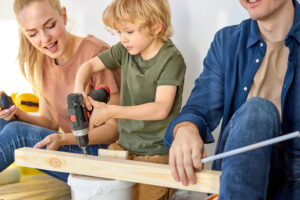
The Ultimate Guide to Parenting — Part 4
July 14, 2025
In the past three months, we have been journeying through Familiaris Consortio and focusing on each of the tasks of the family, given to us by Pope St. John Paull II, opening up the treasure that we can refer to as our guide to parenting! This month we will focus on the third task: Participating in the Development of Society.

Participating in the Development of Society
When families (1) Form a Community of Persons and (2) Serve Life, they will (3) Participate in the Development of Society. How we behave as families affects society. It is up to us whether that effect is positive or negative. JPII affirms, “Since the Creator of all things has established the conjugal partnership as the beginning and basis of human society,” the family is “the first and vital cell of society” (II, 1981). Obviously, if the cell of society is the family and the family is in decline, society has an illness. Contrary to the loud cries of consumerism and in the name of a false freedom, our families possess and continue still “to release formidable energies capable of taking man out of his anonymity, keeping him conscious of his personal dignity, enriching him with deep humanity and actively placing him, in his uniqueness and unrepeatability, within the fabric of society” (II, 1981). Our world needs families who work to be virtuous, hospitable, loving and generous. Our world needs parents who teach their children these virtues through their own witness. John Paul II exhorts, “The very experience of communion and sharing that should characterize the family’s daily life represents its first and fundamental contribution to society” (II, 1981). The culture is watching us, we must be good witnesses.
How Do We Participate in the Development of Society?

First, we teach our children that their contribution to the family home is important. Even young children can help with small tasks at dinnertime. As they grow older, they can take on more difficult chores. Learning to entertain a younger sibling, set and clear the table, unload the dishwasher, help with meal preparation and laundry are all responsibilities that, although they may not want to do them, help our children feel like an important part of the family. Doing jobs that they are capable of, allows them to give a gift of themselves, living in their identity as sons and daughters of God, created in His image and likeness as gift. This contribution at home from an early age will help them to see the value of their participation in society as they grow. You can encourage this as opportunities arise for the family to volunteer at church and in your community.
Secondly, talk about the issues your community is facing. Maybe there is a bond for something in your community. Discuss the pros and cons of the bond. Does this bond affect your family, does it affect the poor and most vulnerable? Having a discussion with your children helps them to see how their choices will matter when they are old enough to vote and teaches them to voice their opinions in a way that fosters a desire to know the truth about the issues that face us today and in the future. In these discussions, make sure you emphasize the core beliefs of our faith instead of a political party divide.

One of the biggest blessings of our family life has been our family prayer group. This group has been meeting almost every month for the last 15 years. It isn’t complicated, we take turns hosting, and everyone brings a dish to share. We visit, and then we read the daily readings and pray the rosary. It’s beautiful to see each person, young and old, offer their intentions and then different members, mostly the younger ones, taking turns with the scripture readings, prayers and decades of the rosary. We have been at each other’s side for the joys and sorrows of our lives. My son and his fiancé were given a wedding shower recently and we discussed how those from our prayer group had been praying for them, and their marriage for 15 years! Entering into the lives of others and sharing our triumphs and challenges helps us to see that we are not alone in our struggles, gives us accountability in our peer groups, and gives us reliable friends to lean on and look up to.

We teach our children to participate in the development of society by first showing them the importance of participating in the life, and work, of our homes. We help them understand that our voices matter when they hear and participate in dialogue about issues our society is facing. They grow in empathy and appreciate community when they witness families supporting each other and gathering for prayer and fellowship. All of these ideas can contribute to accomplishing the third task of the family — Participating in the Development of Society.
What we do with our families in our homes and in our communities matters. We will affect our society; it is up to us to decide whether our impact will be beneficial to our society or if we will contribute to its continued decline.

Written by, Kathleen Cory,
Sales, Training & Implementation Specialist — South
(Article 4 in a series of 5 articles leading up to our fall ’25 banquet themed, Family as the School of Love.)
Share